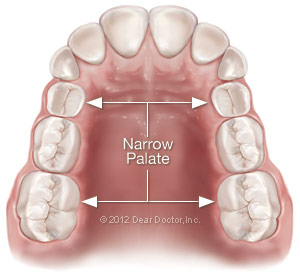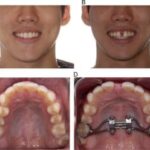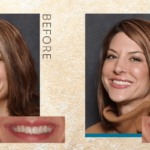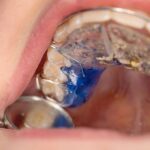There are several possible causes of a small palate. One common cause is genetics, as it can be an inherited trait. Other factors that can contribute to a small palate include certain medical conditions, such as cleft palate, Down syndrome, or Pierre Robin sequence. In some cases, the palate may not fully develop due to environmental factors, such as exposure to certain medications or toxins during pregnancy.
Individuals with a small palate may experience a range of symptoms. These can include difficulty breathing through the nose, snoring, sleep apnea, speech difficulties, and problems with chewing and swallowing. In children, a small palate can also affect the growth and development of the face and jaw.
Treatment options for a small palate depend on the severity of the condition and the specific symptoms experienced. In some cases, no treatment may be necessary if the symptoms are mild or do not significantly impact daily life. However, if the small palate is causing breathing or speech problems, treatment may be recommended.
Symptoms of Small Palate
1. Speech Problems
One of the most noticeable symptoms of a small palate is speech difficulties. The narrow space in the mouth can affect the movement of the tongue and make it harder to pronounce certain sounds correctly. This can lead to speech impediments such as lisping, difficulty pronouncing certain letters or words, and a nasal-sounding voice.
2. Breathing Issues
A small palate can also cause breathing problems, especially during sleep. The restricted space in the mouth can obstruct the airway and lead to snoring, sleep apnea, or difficulty breathing while sleeping. This can result in poor sleep quality, daytime fatigue, and other related health issues.
3. Dental Problems
Individuals with a small palate may also experience dental problems. The narrow space can lead to crowded or misaligned teeth, which can affect the bite and make it harder to maintain proper oral hygiene. This can increase the risk of tooth decay, gum disease, and other dental issues.
4. Swallowing Difficulties
In some cases, a small palate can cause difficulties with swallowing. The reduced space in the mouth can make it harder to chew and swallow food properly, leading to choking or discomfort while eating.
5. Ear Infections
A small palate can also contribute to an increased risk of ear infections. The narrow space in the mouth can affect the function of the Eustachian tubes, which are responsible for equalizing pressure in the middle ear. This can lead to fluid buildup and recurrent ear infections.
Symptoms of Small Palate
1. Speech difficulties:
One of the most common symptoms of a small palate is speech difficulties. The narrow or high-arched palate can affect the movement and positioning of the tongue, making it difficult to pronounce certain sounds correctly. This can lead to speech impediments such as a lisp or difficulty with articulation.
2. Breathing problems:
A small palate can also cause breathing problems, especially during sleep. The narrow space in the mouth can restrict airflow, leading to snoring, mouth breathing, or even sleep apnea. These breathing issues can result in poor sleep quality and daytime fatigue.
3. Dental issues:
A small palate can contribute to dental problems. The crowded or misaligned teeth can make it difficult to maintain proper oral hygiene, increasing the risk of tooth decay and gum disease. It can also lead to bite problems, such as an overbite or underbite.
4. Difficulty eating:
A narrow palate can make it challenging to eat certain foods. The limited space in the mouth can cause difficulty in chewing and swallowing, leading to choking or gagging. This can result in a limited diet and poor nutrition.
5. Ear infections:
In some cases, a small palate can be associated with recurrent ear infections. The narrow space in the mouth can affect the function of the Eustachian tubes, which can lead to fluid buildup in the middle ear and increase the risk of infections.
If you or your child experience any of these symptoms, it is essential to consult a healthcare professional for an accurate diagnosis and appropriate treatment options. Early intervention can help alleviate symptoms and prevent potential complications associated with a small palate.
Treatment for Small Palate
One common treatment option is the use of a palatal expander. This is a device that is placed in the mouth and gradually widens the palate over time. The expander is adjusted periodically by a dentist or orthodontist to ensure that the desired expansion is achieved.
In some cases, orthodontic treatment may also be necessary to correct any misalignment of the teeth that may be contributing to the small palate. Braces or other orthodontic appliances may be used to gradually move the teeth into the correct position.
In addition to these treatment options, it is also important to address any underlying causes of the small palate. For example, if the small palate is caused by a nasal obstruction, such as enlarged adenoids, treating the obstruction may help to alleviate the symptoms.

Dr. Fidel Cann: Esteemed orthodontist with a lifelong dedication to enhancing smiles and oral health. Pioneering expertise, compassionate care.





